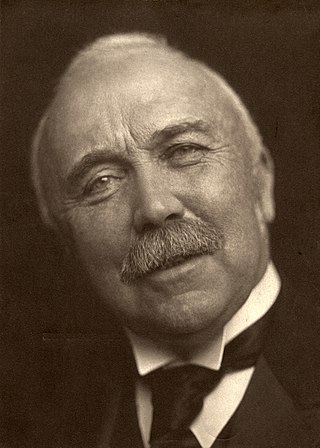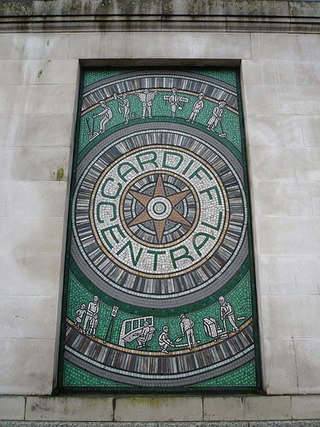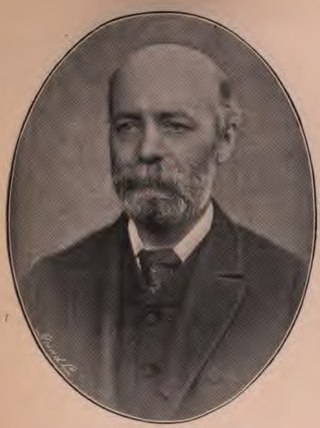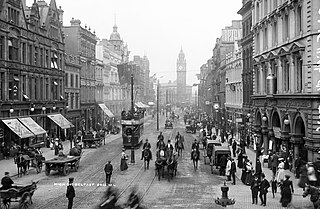
The Liberal Party was one of the two major political parties in the United Kingdom, along with the Conservative Party, in the 19th and early 20th centuries. Beginning as an alliance of Whigs, free trade–supporting Peelites and reformist Radicals in the 1850s, by the end of the 19th century, it had formed four governments under William Gladstone. Despite being divided over the issue of Irish Home Rule, the party returned to government in 1905 and won a landslide victory in the 1906 general election.

Sir Henry Campbell-Bannerman was a British statesman and Liberal politician who served as Prime Minister of the United Kingdom from 1905 to 1908 and Leader of the Liberal Party from 1899 to 1908. He also served as Secretary of State for War twice, in the cabinets of Gladstone and Rosebery. He was the first first lord of the treasury to be officially called the "prime minister", the term only coming into official usage five days after he took office. He remains the only person to date to hold the positions of Prime Minister and Father of the House at the same time, and the last Liberal leader to gain a UK parliamentary majority.

United Kingdom labour law regulates the relations between workers, employers and trade unions. People at work in the UK can rely upon a minimum set of employment rights, which are found in Acts of Parliament, Regulations, common law and equity. This includes the right to a minimum wage of £9.50 for over-23-year-olds from April 2022 under the National Minimum Wage Act 1998. The Working Time Regulations 1998 give the right to 28 days paid holidays, breaks from work, and attempt to limit long working hours. The Employment Rights Act 1996 gives the right to leave for child care, and the right to request flexible working patterns. The Pensions Act 2008 gives the right to be automatically enrolled in a basic occupational pension, whose funds must be protected according to the Pensions Act 1995.

Taff Vale Railway Co v Amalgamated Society of Railway Servants [1901] UKHL 1, commonly known as the Taff Vale case, is a formative case in UK labour law. It held that, at common law, unions could be liable for loss of profits to employers that were caused by taking strike action.

English tort law concerns the compensation for harm to people's rights to health and safety, a clean environment, property, their economic interests, or their reputations. A "tort" is a wrong in civil, rather than criminal law, that usually requires a payment of money to make up for damage that is caused. Alongside contracts and unjust enrichment, tort law is usually seen as forming one of the three main pillars of the law of obligations.
Economic torts, which are also called business torts, are torts that provide the common law rules on liability which arise out of business transactions such as interference with economic or business relationships and are likely to involve pure economic loss.
Tortious interference, also known as intentional interference with contractual relations, in the common law of torts, occurs when one person intentionally damages someone else's contractual or business relationships with a third party, causing economic harm. As an example, someone could use blackmail to induce a contractor into breaking a contract; they could threaten a supplier to prevent them from supplying goods or services to another party; or they could obstruct someone's ability to honor a contract with a client by deliberately refusing to deliver necessary goods.

The Trade Union and Labour Relations (Consolidation) Act 1992 is a UK Act of Parliament which regulates United Kingdom labour law. The Act applies in full in England and Wales and in Scotland, and partially in Northern Ireland.

John Wilson was an English coal miner, trade unionist, and a Liberal Member of Parliament (MP) for more than 25 years.

The Crown Proceedings Act 1947 is an Act of the Parliament of the United Kingdom that allowed, for the first time, civil actions against the Crown to be brought in the same way as against any other party. The Act also reasserted the common law doctrine of Crown privilege but by making it, for the first time, justiciable paved the way for the development of the modern law of public interest immunity.
Allen v Flood [1898] AC 1 is a leading case in English tort law and UK labour law on intentionally inflicted economic loss.
The Trade Union Freedom Bill is a proposal by the United Kingdom Trades Union Congress for legislation which would give greater freedom to unions and their members to collectively bargain and take action to support their interests. It was proposed in 2006, the centenary of the Trade Disputes Act 1906, the founding statute by which unions taking strike action are not liable to employers for the lost profits of business, so long as the action is taken "in contemplation or furtherance of a trade dispute."

Torquay Hotel Co Ltd v Cousins [1968] EWCA Civ 2 (BAILII) is a UK labour law case concerning the liability of a union when its members take industrial action.

Lumley v. Gye [1853] EWHC QB J73 is a foundational English tort law case, heard in 1853, in the field of economic tort. It held that one may claim damages from a third person who interferes in the performance of a contract by another.

Quinn v Leathem [1901] UKHL 2, is a case on economic tort and is an important case historically for British labour law. It concerns the tort of "conspiracy to injure". The case was a significant departure from previous practices, and was reversed by the Trade Disputes Act 1906. However, the issue of secondary action was later restricted from the Employment Act 1980, and now the Trade Union and Labour Relations (Consolidation) Act 1992. The case was heavily controversial at the time, and generated a large amount of academic discussion, notably by Wesley Newcomb Hohfeld, which continued long after it was overturned.

The Trade Union Act 1871 was an Act of the Parliament of the United Kingdom which legalised trade unions for the first time in the United Kingdom. This was one of the founding pieces of legislation in UK labour law, though it has today been superseded by the Trade Union and Labour Relations (Consolidation) Act 1992.
Economic torts in English law refer to a species of civil wrong which protects the economic wealth that a person will gain in the ordinary course of business. Proving compensation for pure economic loss, examples of an economic tort include interference with economic or business relationships.
Collective action in the United Kingdom including the right to strike in UK labour law is the main support for collective bargaining. Although the right to strike has attained the status, since 1906, of a fundamental human right, protected in domestic case law, statute, the European Convention on Human Rights and international law, the rules in statute have generated significant litigation. The "right of workers to engage in a strike or other industrial action" is expressly recognised in the Trade Union and Labour Relations (Consolidation) Act 1992 section 180, and has been recognised repeatedly by the Court of Appeal as "a fundamental human right"., and the House of Lords.
The law for workplace bullying is given below for each country in detail. Further European countries with concrete antibullying legislation are Belgium, France, and The Netherlands.
The Strikes Bill 2023 is a proposed Act of Parliament affecting UK labour law designed to force trade union workers in England, Scotland and Wales to provide a minimum service during a strike in health, education services, fire and rescue, border security and nuclear decommissioning. The proposal has been criticised as being not in the 2019 Conservative Party Manifesto, being a violation of human rights, and being a violation of international law.











